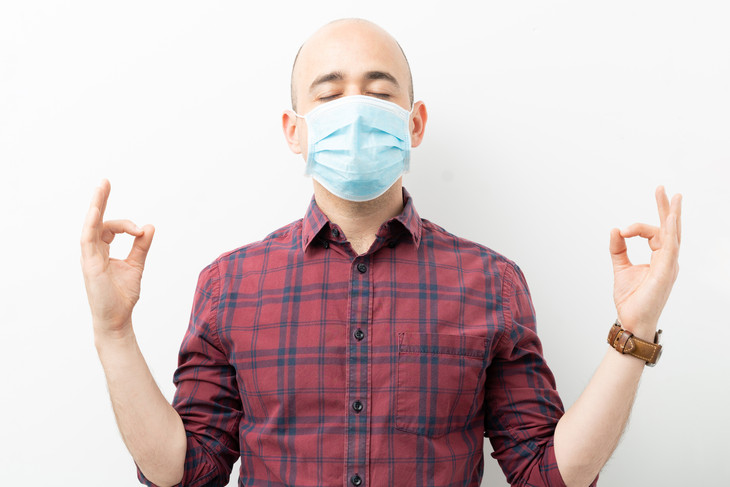
The early days of the COVID-19 pandemic contributed to negative mental health effects for many in the U.S., according to new Penn State research. But the researchers also found that some coping techniques — like wearing masks and focusing on self-care — were linked with positive mental health.
Erina MacGeorge, professor of communication arts and sciences, said the results — recently published in the International Journal of Environmental Research and Public Health — may give clues about how people can continue to cope with the pandemic, as well as which populations may need extra care and assistance.
“These populations may include young people, those with pre-existing conditions, and those who don’t have much social support from family and friends,” MacGeorge said. “As individuals, we can help bolster our own mental health by protecting ourselves from COVID-19 as much as possible — like with social distancing, hand-washing, and mask-wearing — by seeking support when we need it, and choosing activities that keep us moving forward, such as looking for safe ways to have fun and help others.”
After the World Health Organization declared COVID-19 a global pandemic in the middle of March 2020, a cascade of measures meant to slow the spread — such as school and business closures and social distancing requirements — went into effect.
The researchers said that while necessary, these measures helped contribute to people experiencing excess stress not only from fear of the disease itself, but also from other factors such as financial stress, problems finding child care, and separation from friends and family, among others.
“I’ve spent much of my career studying social support, which is one important factor in how people respond to traumatic events,” said MacGeorge. “Living through the earliest weeks of the pandemic, talking with friends, and reading news stories about the challenges we were all facing, I wanted to study relationships, supportive communication, and health during the pandemic.”
The researchers recruited participants between the ages of 18 and 90 for the study. Participants were asked to complete surveys at three points in time: one on April 20, one between May 4 and 8, and one between May 18 and 22. A total of 442 participants participated in all three surveys.
In each survey, participants answered questions designed to measure symptoms of depression and anxiety, as well as ones designed to measure how well participants were coping with traumatic events. The surveys also measured how much the participants felt the pandemic was affecting them financially, physically, socially and mentally, as well as whether participants were adhering to recommendations — such as mask wearing — and what kinds of coping strategies they were using.
The researchers found that levels of stress, anxiety and depression were highest at the beginning of the study, at the end of April. By the time the study ended near the end of May — when many states were making plans to reopen — these levels were lower. Younger people and people with pre-existing health conditions were more likely to have negative mental health outcomes.
According to the researchers, “social strain” — such as someone making demands, giving criticism, or simply getting on your nerves — was the strongest and most consistent predictor of mental health.
“This suggests that in difficult times like this, it could be particularly important to proactively structure our social networks in ways that minimize negative social experiences,” said Yanmengqian “Alison” Zhou, a graduate assistant in communication arts and sciences.
However, MacGeorge said that several “forward-focused” coping strategies were associated with better mental health.
“Things like keeping a consistent schedule, reminding yourself that things will get better, finding activities to distract yourself, and taking care of others who need help are all helpful,” MacGeorge said. “Additionally, adhering to the national recommendations for protecting oneself from COVID-19, like hand-washing, social distancing and masking, was also associated with better mental health.”
Jessica Myrick, associate professor of media studies, said the study suggests that physical and mental health are interconnected.
“Sometimes we need to take a break from thinking about how we feel and do something to help alleviate the threat and make us feel a lot better about our situation in life,” Myrick said. “COVID-related messages that emphasize that even small actions are worthwhile might have the doubly positive effect of getting people to take small actions, like washing their hands more often, but also alleviate some mental strain, too.”
MacGeorge added that it’s important to note that the data for their study was collected in April and May, before the protests following the killing of George Floyd and the ramping up of presidential campaigns.
“The pandemic had not been going on very long at that point,” MacGeorge said. “Many states were just starting to ‘reopen,’ and there was a temporary flattening of the COVID-19 illness and death curve at that time. There is reason to believe that the mental health impacts of the continuing pandemic will be stronger than they appeared in our study in May, especially for people who have lost loved ones, who are now out of work, or who have suffered racial prejudice and discrimination.”
Original source: https://news.psu.edu/story/631524/2020/09/14/research/certain-coping-strategies-can-help-offset-pandemics-mental-health?utm_source=newswire&utm_medium=email&utm_term=631729_HTML&utm_content=09-14-2020-21-02&utm_campaign=Penn%20State%20Today